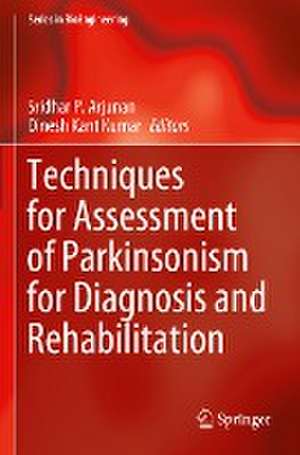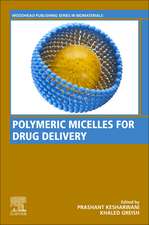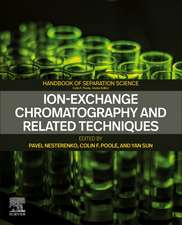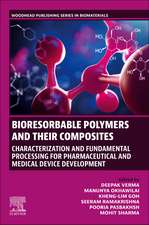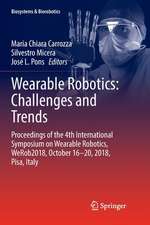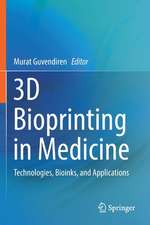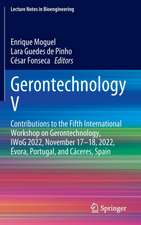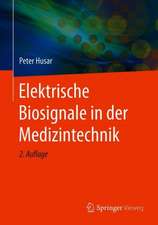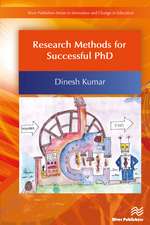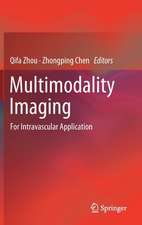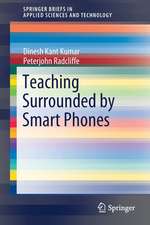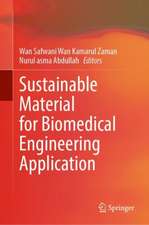Techniques for Assessment of Parkinsonism for Diagnosis and Rehabilitation: Series in BioEngineering
Editat de Sridhar P. Arjunan, Dinesh Kant Kumaren Limba Engleză Paperback – 4 aug 2022
| Toate formatele și edițiile | Preț | Express |
|---|---|---|
| Paperback (1) | 1150.98 lei 6-8 săpt. | |
| Springer Nature Singapore – 4 aug 2022 | 1150.98 lei 6-8 săpt. | |
| Hardback (1) | 1157.90 lei 6-8 săpt. | |
| Springer Nature Singapore – 3 aug 2021 | 1157.90 lei 6-8 săpt. |
Din seria Series in BioEngineering
- 15%
 Preț: 576.89 lei
Preț: 576.89 lei - 5%
 Preț: 995.70 lei
Preț: 995.70 lei - 5%
 Preț: 1164.31 lei
Preț: 1164.31 lei - 5%
 Preț: 720.84 lei
Preț: 720.84 lei - 5%
 Preț: 716.45 lei
Preț: 716.45 lei - 15%
 Preț: 643.65 lei
Preț: 643.65 lei - 5%
 Preț: 729.98 lei
Preț: 729.98 lei - 5%
 Preț: 711.88 lei
Preț: 711.88 lei - 5%
 Preț: 1104.48 lei
Preț: 1104.48 lei - 5%
 Preț: 1432.38 lei
Preț: 1432.38 lei - 5%
 Preț: 1413.56 lei
Preț: 1413.56 lei - 5%
 Preț: 1100.09 lei
Preț: 1100.09 lei - 5%
 Preț: 1289.76 lei
Preț: 1289.76 lei - 5%
 Preț: 727.08 lei
Preț: 727.08 lei - 5%
 Preț: 1299.81 lei
Preț: 1299.81 lei - 5%
 Preț: 719.02 lei
Preț: 719.02 lei - 5%
 Preț: 1166.49 lei
Preț: 1166.49 lei - 5%
 Preț: 724.29 lei
Preț: 724.29 lei - 15%
 Preț: 639.90 lei
Preț: 639.90 lei - 5%
 Preț: 1288.99 lei
Preț: 1288.99 lei - 18%
 Preț: 726.37 lei
Preț: 726.37 lei - 5%
 Preț: 1048.90 lei
Preț: 1048.90 lei - 5%
 Preț: 1164.10 lei
Preț: 1164.10 lei - 5%
 Preț: 1165.40 lei
Preț: 1165.40 lei - 5%
 Preț: 714.46 lei
Preț: 714.46 lei - 5%
 Preț: 643.87 lei
Preț: 643.87 lei - 5%
 Preț: 1291.57 lei
Preț: 1291.57 lei - 15%
 Preț: 638.57 lei
Preț: 638.57 lei
Preț: 1150.98 lei
Preț vechi: 1211.55 lei
-5% Nou
Puncte Express: 1726
Preț estimativ în valută:
220.27€ • 239.18$ • 185.02£
220.27€ • 239.18$ • 185.02£
Carte tipărită la comandă
Livrare economică 22 aprilie-06 mai
Preluare comenzi: 021 569.72.76
Specificații
ISBN-13: 9789811630583
ISBN-10: 9811630585
Pagini: 167
Ilustrații: X, 167 p. 5 illus., 4 illus. in color.
Dimensiuni: 155 x 235 mm
Greutate: 0.26 kg
Ediția:1st ed. 2022
Editura: Springer Nature Singapore
Colecția Springer
Seria Series in BioEngineering
Locul publicării:Singapore, Singapore
ISBN-10: 9811630585
Pagini: 167
Ilustrații: X, 167 p. 5 illus., 4 illus. in color.
Dimensiuni: 155 x 235 mm
Greutate: 0.26 kg
Ediția:1st ed. 2022
Editura: Springer Nature Singapore
Colecția Springer
Seria Series in BioEngineering
Locul publicării:Singapore, Singapore
Cuprins
1. Parkinson’s Disease.- 2. Measuring Parkinson’s Disease symptoms.- 3. Demographics profiles of Parkinson’s Disease.- 4.Tremors and Bradykinesia.- 5. Handwriting of Parkinson’s Disease.- 6. Gait and Posture.- 7. Olfactory.- 8. Eye Gaze and Facial expression.- 9. Voice symptoms.- 10. Treatment of Parkinson’s Disease.- 11. Misdiagnosis of Parkinson’s Disease.- 12. Modelling of Basal Ganglia of Parkinson’s Disease.
Notă biografică
Sridhar P. Arjunan is currently a Research Assistant Professor at the Center for Human Movement Research and Analysis , Department of Electronics and Instrumentation Engineering, SRM Institute of Science and Technology, India. He received his Ph.D. degree in Electronics and Biomedical Engineering from RMIT University, Australia, in 2009, and was a Postdoctoral Research Fellow at Biosignals Lab at RMIT University. Dr. Arjunan is a recipient of a SPARC-MHRD Project (2019-21), SERB (2018-21), CASS Australian Early Career Researcher grant (2010), RMIT SECE Research Scholarship (2006–2008) and German State Research Scholarship (2006) and he has published over 100 research articles in various journals and conferences. His major research interests include biomedical signal processing, rehabilitation studies, fractal theory, human movement and human–computer interface applications.
Dinesh Kant Kumar holds a B.Tech. from IIT Madras and Ph.D. from IIT Delhi, and is currently a Professor at RMIT University, Melbourne, Australia. He has published over 400 papers, authored 5 books and is on a range of Australian and international biomedical engineering committees. His passion is for affordable diagnostics and making a difference for his students. His work has been cited over 5600 times, and he has also had multiple successes with technology translation.
Dinesh Kant Kumar holds a B.Tech. from IIT Madras and Ph.D. from IIT Delhi, and is currently a Professor at RMIT University, Melbourne, Australia. He has published over 400 papers, authored 5 books and is on a range of Australian and international biomedical engineering committees. His passion is for affordable diagnostics and making a difference for his students. His work has been cited over 5600 times, and he has also had multiple successes with technology translation.
Textul de pe ultima copertă
This book describes the range of technologies that have been developed for diagnosing and assessing Parkinson’s disease patients. Also presenting the latest studies providing insights into the changes to the neural system in Parkinson’s disease, it is a valuable resource for neurologists, general practitioners and nurses. Further, the book highlights areas that require more research, and as such will appeal to researchers, biomedical engineers and clinicians.
Caracteristici
Discusses comprehensively the range of technologies for diagnosing and assessing Parkinson’s disease patients Describes the latest studies providing insights into the changes to the neural system in Parkinson’s disease Identifies significant research gaps and highlights opportunities for impactful research in this field
